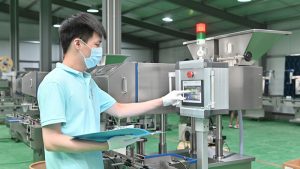Getting Started with Your Pill Presser Machine
Operating a pill presser machine efficiently begins with a solid understanding of its components and capabilities. Typically, these machines can produce between 5,000 to 10,000 tablets per hour, depending on their size and the complexity of the tablet design. This high level of output demands precision and careful management to optimize performance and minimize downtime.
Optimal Setup and Preparation
First, ensure proper setup: Aligning the pill presser correctly from the start is crucial. This means checking that all parts are secure, the fill depth and punch pressure settings are accurate, and the die is correctly positioned. A correctly set up machine minimizes waste and increases the lifespan of the components.
Selecting the Right Formulation
The choice of powder blend is critical. The powder must have the right flow properties and granule size to ensure uniform filling and consistent tablet quality. Using a poorly formulated powder can lead to issues like capping (where the top of the tablet separates) or sticking to the punch faces. Conducting a few test runs can help determine if the powder blend works well with the settings of your pill presser machine.

Maintaining Consistent Operation
Keep an eye on speed and temperature: Running the machine at the optimal speed that balances quality and quantity is essential. Too fast may lead to mechanical stress and poor tablet quality, while too slow can reduce output inefficiency. Additionally, maintaining a consistent temperature helps prevent the powder from sticking, which is crucial in humid environments.
Regular Cleaning and Maintenance
Routine maintenance cannot be overlooked. After each batch, cleaning the machine thoroughly prevents cross-contamination and ensures that no residual powder clogs the system. Regular checks and replacements of worn-out parts such as punches and dies keep the machine running smoothly and prevent unexpected downtime.
Training and Skills Development
Ensuring that operators are well-trained is as vital as the mechanical upkeep. Skilled operators can detect minor issues before they escalate into major problems, manage the machine's settings more effectively, and adjust operations dynamically based on the tablet output's real-time feedback.
Leveraging Automation for Efficiency
For facilities looking to enhance efficiency, integrating automation within the pill pressing process can lead to significant improvements. Automated systems can adjust the press parameters in real-time, monitor quality continuously, and even predict maintenance needs based on data analytics.
Staying Ahead with Efficient Practices
Implementing these practices will ensure that your pill presser machine operates at peak efficiency, producing high-quality tablets consistently. Remember, efficiency in operation is not just about speed; it's about maximizing output while maintaining the highest standards of quality and safety in tablet production. This strategic approach not only optimizes production times but also enhances the overall reliability of your pharmaceutical manufacturing processes.
